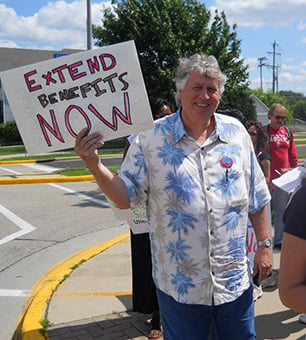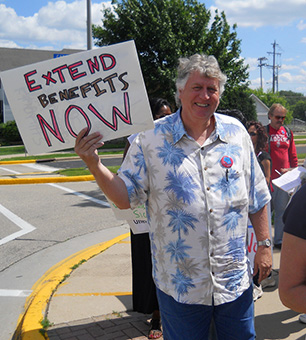 (Photo: wisaflcio / Flickr)Dale Sexton, a software product manager, lost his job over the summer, and he’s been searching for a new one ever since. He’s one of the more than four million faces of the new American economy: the long-term unemployed, people who have been seeking work for six months or more. More than a year ago, the New York Times accurately described the unemployment situation as a “crisis,” noting that long-term unemployment came at a high human cost, and disturbingly, research suggests it’s harder to get a job when you’ve been out of work for six months or more.
(Photo: wisaflcio / Flickr)Dale Sexton, a software product manager, lost his job over the summer, and he’s been searching for a new one ever since. He’s one of the more than four million faces of the new American economy: the long-term unemployed, people who have been seeking work for six months or more. More than a year ago, the New York Times accurately described the unemployment situation as a “crisis,” noting that long-term unemployment came at a high human cost, and disturbingly, research suggests it’s harder to get a job when you’ve been out of work for six months or more.
No small wonder, then, that the true number of long-term unemployed may be much, much higher, as current statistics fail to factor in people who have simply given up. An estimated six million people in the United States have fallen into the cracks, going back to school, seeking under the table employment, or disappearing into poverty traps that are difficult to recover from. The United States is facing a social crisis with scores of unemployed people unable to meet their needs, relying on government benefits to keep themselves fed, housed and clothed while they seek new opportunities.
But thanks to political wrangling, those benefits could be about to vanish. Very, very abruptly. Just days before the new year, an estimated 1.3 million people will no longer be eligible for long-term unemployment benefits, and the government safety net will drop out from under them. Mere weeks later, nearly a million people will join them as their benefits expire as well.
It didn’t have to be this way. Congress had an opportunity to extend benefits before the winter break, but that would have required budget agreement and cooperation between the ferociously warring political parties. The GOP strongly opposed extending benefits, with arguments relying on the idea that it’s not the government’s responsibility to support needy Americans, and suggestions that benefits acted as a disincentive to work. While Democrats attempted to push through a deal, they met strong opposition, with Republicans only agreeing if the Democrats would cut money from elsewhere in the already perilous budget to cover the benefits, to the tune of 25 billion dollars.
Research on the effects of long-term unemployment benefits on the economy shows that for every dollar the government pays out, the economy benefits to the tune of $1.60. As people on benefits spend them on food and other supplies, they stimulate their local economies, engage local businesses and keep their communities economically functional. Without these benefit funds in the economy next year, already depressed and struggling communities could face even more problems, leading to a spread of economic depression including a surge in the unemployment rate as companies are forced to let people go. Thus, the refusal to extend benefits could have a long-term ripple effect with seriously negative outcomes.
The issues with unemployment benefits don’t only signal bad news for beneficiaries counting on that money to get through the next few weeks and months. They’re also taking place within the larger context of a society that’s experiencing very conflicted views on how it wants to handle poverty, social need and joblessness. While some in the United States promote a supportive social safety net that works to help people get on their feet and reestablish their lives, others favor a more traditionalized “bootstrapping” approach, insisting that people should be encouraged to fend for themselves rather than being supported by the government. Critics have pointed out that the bootstrapping mentality can amount to a “war on the poor,” as many low-income people in the United States are not in an ideal position to rebuild their lives on their own.
These political tensions are at the root of many disputes in Congress and a larger social schism in the United States as the nation faces a crisis of conscience: what kind of country does it want to be?
Media that fights fascism
Truthout is funded almost entirely by readers — that’s why we can speak truth to power and cut against the mainstream narrative. But independent journalists at Truthout face mounting political repression under Trump.
We rely on your support to survive McCarthyist censorship. Please make a tax-deductible one-time or monthly donation.
